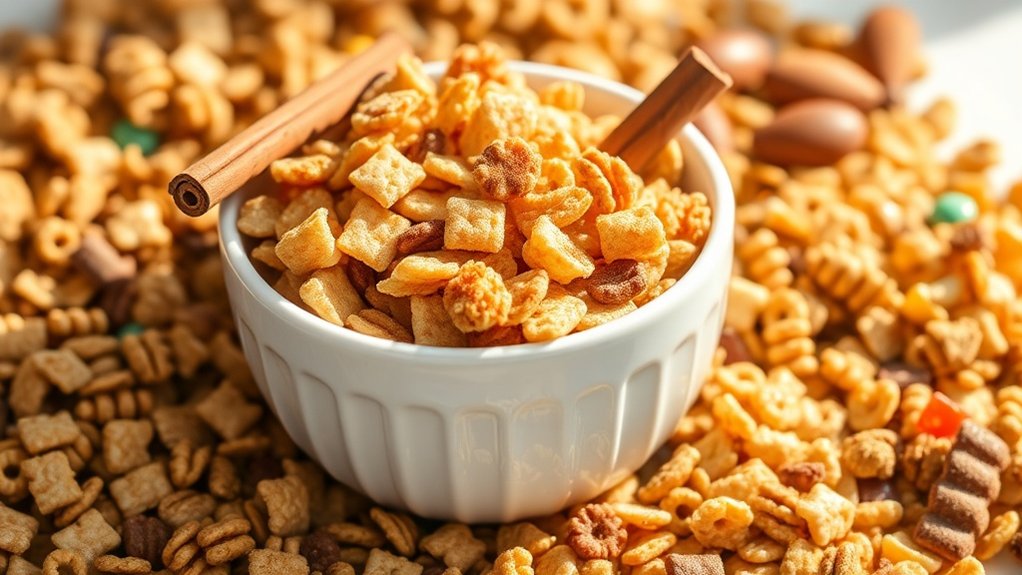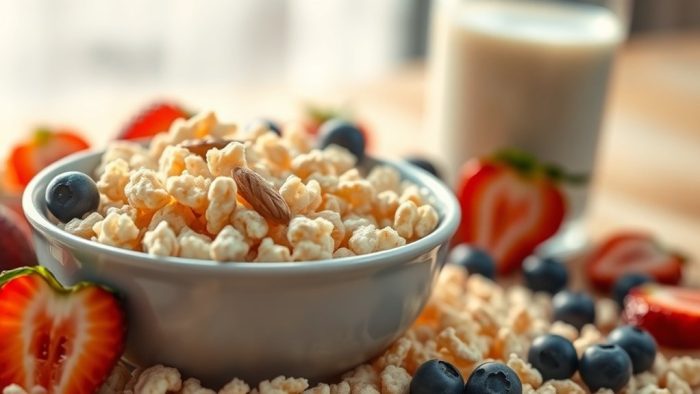Is Cinnamon Toast Crunch Vegan

No, Cinnamon Toast Crunch isn’t vegan. The cereal contains Vitamin D3 (cholecalciferol), which is derived from lanolin—a substance extracted from sheep’s wool. Additionally, the sugar may be processed using bone char, an animal-derived filtration method, and the natural flavors lack transparency about their origins. While most base ingredients like whole grain wheat and cinnamon are plant-based, these animal-derived components disqualify it from vegan status. You’ll find several plant-based alternatives and regional considerations that affect this cereal’s suitability for your dietary needs below.
Breaking Down the Cinnamon Toast Crunch Ingredient List

The ingredient panel reveals several components that compromise Cinnamon Toast Crunch’s vegan status. When you examine whether are cinnamon toast crunch vegan, you’ll find Vitamin D3 poses the primary concern. This nutrient derives from lanolin, a substance extracted from sheep’s wool, making it an animal product.
Additionally, the sugar undergoes potential refinement through bone char, which strict vegans reject due to its animal origin.
While ingredients like whole grain wheat, rice flour, cinnamon, maltodextrin, and dextrose contain no animal derivatives, they can’t offset the Vitamin D3 issue.
You’ll also encounter natural flavors on the label, which may source from either plant or animal origins. The manufacturer doesn’t clarify their derivation, creating additional uncertainty.
These problematic ingredients collectively prevent Cinnamon Toast Crunch from qualifying as vegan-friendly.
The Vitamin D3 Problem: Why This Cereal Isn’t Vegan
Among all ingredients that disqualify Cinnamon Toast Crunch from vegan status, Vitamin D3 stands as the most significant barrier. This form of cholecalciferol, while essential for calcium and phosphorus absorption, typically derives from lanolin—a substance extracted from sheep’s wool.
You’ll find this ingredient listed in the cereal’s fortification panel, making it fundamentally incompatible with vegan principles. The extraction process raises ethical concerns about sheep welfare that extend beyond dietary preferences.
While the cereal’s base ingredients might appear plant-based initially, this animal-sourced vitamin definitively categorizes it as non-vegan. General Mills could reformulate using plant-based Vitamin D2 or vegan D3 derived from lichen, potentially expanding their market reach to strict vegans who currently must avoid this popular breakfast option.
Hidden Animal Products: Sugar Processing and Natural Flavors

Beyond the clearly labeled Vitamin D3, Cinnamon Toast Crunch contains ingredients with murky origins that complicate its vegan status. The sugar used in this cereal may be cane sugar refined with bone char, a filtration process that involves charred animal bones.
Manufacturers aren’t required to disclose whether they use bone char, making it difficult to verify if the sugar is truly plant-based. Beet sugar typically avoids this processing method, but General Mills doesn’t specify their sugar source.
Additionally, the “natural flavors” listed on the ingredient panel could be derived from animal sources. Companies aren’t obligated to reveal the specific origins of these flavoring agents, leaving you uncertain about what you’re actually consuming.
For strict vegans, these hidden animal-derived components present significant ethical concerns beyond the obvious non-vegan ingredients.
Regional Variations and Manufacturing Considerations
When purchasing Cinnamon Toast Crunch internationally, you’ll encounter significant formulation differences that directly impact its vegan status.
UK’s Curiously Cinnamon, for instance, may contain different Vitamin D3 levels sourced from lanolin, a sheep wool derivative. Manufacturing processes vary regionally, particularly affecting sugar refinement—some areas use bone char filtering while others don’t.
Local regulations influence transparency considerably. Certain countries mandate explicit labeling of animal-derived ingredients, making vegan assessment straightforward.
However, manufacturers’ ethical sourcing commitments differ across regions, potentially introducing non-vegan elements into otherwise plant-based formulations.
You must examine ingredient labels specific to your location, as formulations change over time and between markets.
What’s vegan-friendly in one country may contain animal products elsewhere, making regional awareness essential for informed purchasing decisions.
Vegan-Friendly Cinnamon Cereal Alternatives

Given these regional complexities and potential non-vegan ingredients in mainstream Cinnamon Toast Crunch, several certified plant-based alternatives deliver comparable cinnamon-sugar satisfaction.
Cascadian Farm Organic Cinnamon Crunch provides authentic flavor without animal-derived ingredients, while Nature’s Path Sunrise Crunchy Cinnamon features organic certification and dairy-free formulation.
Barbara’s Organic Puffins Cinnamon offers similar texture profiles with confirmed vegan status.
When selecting alternatives, you’ll want to verify explicit “vegan” labeling on packaging, as this certification guarantees complete absence of eggs, dairy, and animal-derived processing agents.
Brands like Vans and Catalina Crunch expand your options further, particularly if you’re managing additional dietary requirements like gluten sensitivity or ketogenic macros.
These alternatives maintain the characteristic cinnamon sweetness while aligning with plant-based nutritional principles and ethical consumption standards.





